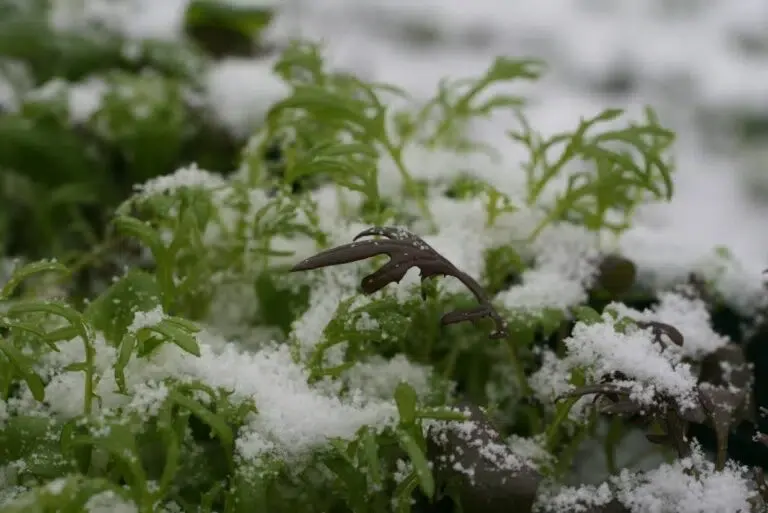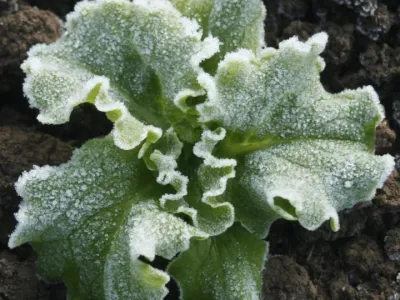Summary
In Austria, the Operational Group ‘Further development of organic winter vegetables’ has found that site-specific strategies and robust crop varieties ensure high yields without heating. Winter vegetables are ecologically and economically sustainable, reducing CO2 emissions and costs.
Currently, most salads and herbs available in Austria during the winter are imported. Growing domestic organic winter vegetables offers a resource-saving way to expand the variety of vegetables and specialties available. This approach presents an attractive market niche for farmers, driven by the increasing consumer demand for locally sourced products. By utilising the winter months, which are typically inactive for production, farms can increase their added value, while reducing the need for imports through domestic cultivation.
In Austria, the Operational Group ‘Further Development of Organic Winter Vegetables’ brought together experts from farming practice in horticulture, consulting, and research, working together to advance organic winter vegetable cultivation. Their focus was on finding practical solutions to enhance production, meet quality standards, improve packaging, optimise crop rotation, and boost the profitability of these crops through on-farm trials. By combining scientific research with hands-on farming experience, the project equipped farms with the knowledge needed to adopt sustainable cultivation methods successfully. By the end of the project, the participating farms had all included winter vegetables in their regular crop rotation. The long-term vision is to establish energy-efficient winter vegetable farming across Austria, reducing dependence on imports and providing an environmentally friendly alternative to heated greenhouse production. This initiative not only supports organic vegetable farms but also benefits consumers by increasing the availability of fresh, locally grown organic produce during the winter season.
The cultivation trials, conducted across diverse farms over three years, showed promising results. A key success is the adaptability of cultivation strategies to different climates. Farms that tailored their planting schedules to local weather conditions achieved high yields, even with minimal adjustments of just a couple of weeks. This flexibility proved effective, especially during the challenging autumn and winter months. Strategic cultivation practices, such as staggered planting, have helped ensure consistent harvests. Additionally, the selection of robust varieties contributed significantly to successful outcomes. Trials with crops such as bunch carrots, salads, radishes, and bunch onions demonstrated that seedfast plant varieties (compared to hybrid varieties), despite being slightly less uniform, provided reliable yields and strong resilience. These results offer a solid foundation for farmers to continue improving their cultivation methods.
The ecological and economic analysis highlighted the strong potential of winter vegetables to contribute to sustainable farming. Data from diverse farms showed that winter vegetables can outperform traditional crops in terms of sustainability. They produce lower CO2 emissions compared to crops cultivated in heated greenhouses, supporting Austria's environmental goals. From an economic perspective, winter vegetables turned out to be cost-effective. They help secure farm income during off-peak seasons and integrate seamlessly into crop rotations, enhancing land use efficiency. Lower production costs and reduced business risks make them an attractive option for farmers. The combination of ecological benefits and economic viability demonstrates that winter vegetable cultivation is both sustainable and profitable.
The project also achieved significant progress in other key areas. Optimising work processes has led to more efficient harvesting and packaging methods, reducing manual labour and improving productivity. Training sessions and practical guidelines have helped disseminate these best practices among farmers. Consumer engagement has been another success story. The development of sensory profiles for winter vegetables has enhanced marketing strategies, making these products more appealing to consumers. Efforts to find sustainable packaging solutions are also promising. While ongoing research is needed, the project identified eco-friendly materials that align with the principles of resource-efficient farming, paving the way for future innovations.
This project has significantly advanced our understanding of organic winter vegetable cultivation, highlighting the many successes achieved in sustainable farming practices. The positive results from cultivation trials, ecological-economic analysis, and complementary initiatives provide a strong foundation for expanding winter vegetable production in Austria. These achievements offer practical solutions for farmers and contribute to a more sustainable agricultural future
Contact Information
Auf der Gugl 3, 4021 Linz
Austria
Ruth.Bartel-Kratochvil
Project coordinator


